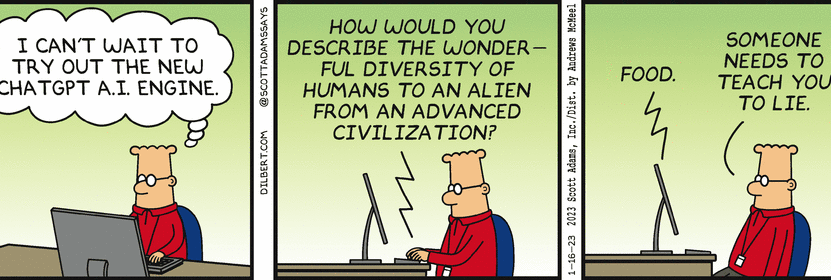
Knock knock.
Who’s there?
Real Estate.
Real Estate who?
Real Estate the perfect home for you
Yeah, I didn’t get it either…
BUT – that was the result when I asked an Artificial Intelligence (AI) engine to tell me a knock-knock joke about real estate agents.
So, AI is clearly not ready for prime time, right?
Wrong.
AI and “ChatGPT” in particular have been taking the world by storm over the last month or two.
There are examples all over Twitter of people using ChatGPT very effectively to code, write email campaigns, write blogs, create marketing copy, write effective business plans, write research papers, do market analyses, and much more.
It is so effective in fact that many observers are very worried about AI taking over much of our workforce, fostering mass unemployment, and completely disrupting society.
Even mighty Google is worried that it will take over many of the search functions that Google currently dominates.
So – when will AI take over lending?
In a recent blog, I mentioned a lender called First Nationwide. I sent them hundreds of loans in the 1990s because they figured out that borrowers with a 760+ FICO, a 25% equity cushion, and liquid assets equal to six months of stated income almost never default or miss payments.
And despite the fact that almost all lenders know what First Nationwide knew – we now have to make borrowers with those same criteria provide full loan packages with tax returns, paystubs, W2s, bank statements, letters of explanation, rent verifications, employment verifications, and you-name-it-else to qualify for a loan.
The above is just one example of a type of borrower that never defaults.
There are myriad algorithms that lenders could employ now to instantly provide loan approvals with far more accuracy than what traditional underwriting could ever provide.
These algorithms could instantaneously comb the internet for data points that could provide stunningly accurate underwriting results.
The data points could be anything too, including age, education levels, location, hobbies, associates (derived from social postings), type of vehicle, and travel. More traditional data points involving employment, income, and assets (all of which could also already be estimated with amazing accuracy) could also be employed. And finally, more sensitive data points could be employed too such as gender, ethnicity, religion, etc. – but that would never be allowed (and I am certainly not advocating it – to be clear).
My main point is that there are literally hundreds of data points (that often have nothing to do with one’s finances) that can be scooped up instantly from the internet already and that can be fed into an algorithm to instantly gauge someone’s credit risk – with amazing accuracy.
So – why don’t regulators and politicians allow us to use algorithms when they would save everyone so much time and money? Here are a few possible reasons.
- MONEY. The current system allows commercial banks, mortgage banks, Fannie Mae and Freddie Mac to make a huge amount of money. And those institutions in turn either donate money to politicians or, in the case of Fannie and Freddie, channel money directly to the government. And those money machines need our current system to remain in place.
- POWER. Our regulators and politicians can only demand those “donations” if they have the power to regulate the institutions sending the donations – which again requires our current system to remain in place.
- COVER UP. The 2008 mortgage meltdown was largely caused by the Fed and politicians, as they kept rates too low for too long, encouraged “affordable housing goals” that resulted in excessively loose lending standards, allowed Fannie Mae to buy up subprime loans en masse and create an artificial market for them, and allowed the rating agencies to give “AAA” ratings to pools of subprime loans. As a result, politicians needed to make it seem like we need massive regulations and excessive underwriting to make it look like 2008 was the mortgage industry’s fault, and not the government’s.
- HELPING PROTECTED CLASSES. Some demographic groups would likely benefit more than others from the use of pure algorithms, and that is not something that many people (politicians and voters alike) would want to see in a country that is very concerned about equality. While reasons #1 – #3 are all bad, this reason may well be justified.
BUT – if regulators and politicians won’t let lenders use algorithms now, it is extremely unlikely that they will allow AI to take over lending in a more powerful way for the same reasons.
What AI will do though is take over more and more of the traditional underwriting process, and that will hopefully make things a little easier for professional baseball pitchers with 3% debt ratios.
We are using AI engines already in fact to underwrite many of our less complex files, to help garner asset and employment verifications, to find the best interest rate, and to generate disclosures.
It will, however, be a long time before borrowers can push a button and get a mortgage loan (even though that technology is available now).

Jay Voorhees
Founder | JVM Lending
(855) 855-4491 | DRE# 1197176, NMLS# 310167












